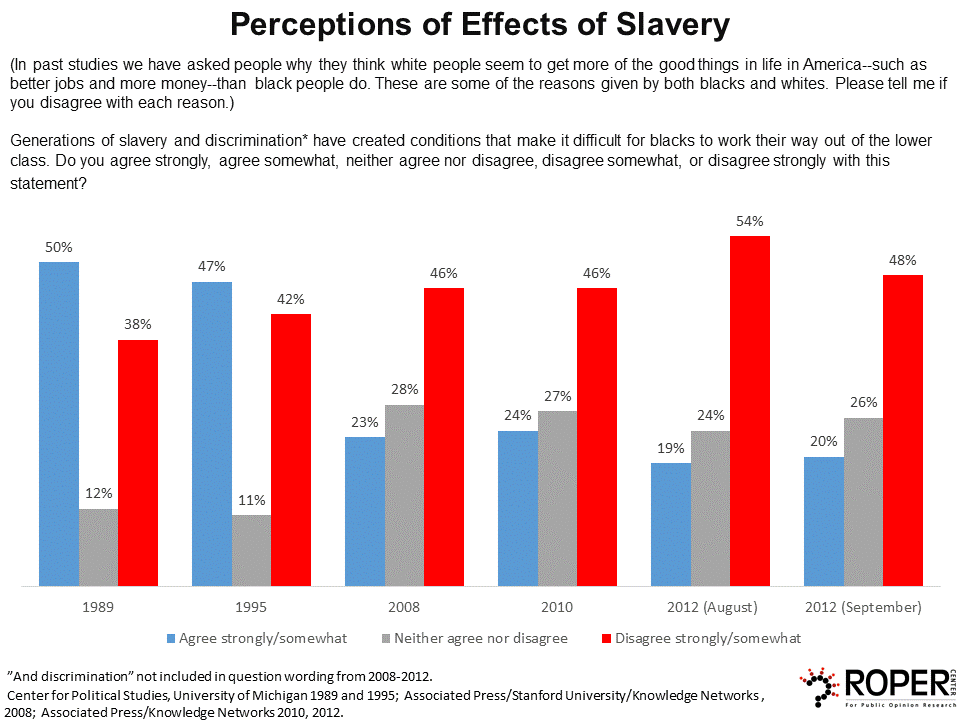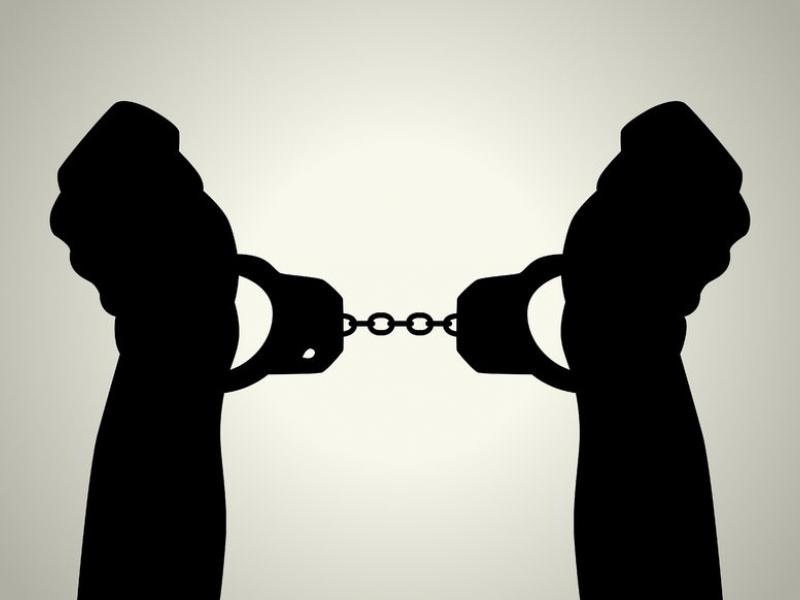Slavery may have ended in 1863, but its legacy reverberates still. Black and white Americans continue to grapple with the question what relevance this part of the country's past has to today's racial issues — and find very different answers. A review of polling on America's "original sin": TV brings the issue to polling The first time Americans were asked about their country's history of slavery was in relation to the pioneering television series Roots in 1977. In a Harris poll, nearly seven in ten Americans said they watched at least part of the series, which depicted the saga of an African-American family from 1750 to post-Civil War. Fifty-five percent of viewers believed it was accurate in its depiction of slavery; 28% disagreed, and 17% weren't sure. Changing perceptions on lasting effects of slavery The next question to address the subject came more than a decade later, when the 1988 ANES study asked Americans about their perceptions of the continued effects of slavery on Americans' lives. About half said that they agreed strongly or somewhat that generations of slavery and discrimination had produced conditions that made it difficult for black people to work their way out of the lower class. The proportion saying they agreed dropped to 23% when this question was asked in a representative online poll in 2008 and remained roughly at that level through 2012. It is worth noting that the methodological changes may be as important as the time difference in this shift, as this topic is a sensitive one in which respondents may be more inclined to give certain answers in the greater anonymity of an online poll. A version of this question was asked in 2015 PRRI/NORC poll conducted both online and via telephone. In this poll, 41% said they "completely" or "mostly" agreed, a change also in response scale which also makes comparisons imperfect. 
Apologies and Reparations: Unpopular ideas (among whites) Given that the majority of the country has not, over the past several decades, believed that slavery is a cause for today's racial inequalities, it is not surprisingly that there has been only minimal support for the government taking action to make amends for slavery. Even the symbolic gesture of an official apology has been rejected by the majority of Americans. In a 1997 PSRA/Pew poll, just 32% of whites - but 64% of blacks - said they favored President Clinton asking the country to apologize to African Americans for slavery. In 1997, a Gallup/CNN/USA Today poll also found 31% supporting a government apology. In 2002, in the last question on the subject, support for a government apology reached a high of 42% in an ABC News poll. Similarly, a 2002 Gallup/CNN/USA Today poll found that just 41% of Americans believed that still-extant corporations that made profits from slavery should apologize to black Americans who are descendants of slaves; 55% thought they should not. While apologizing for slavery is unpopular, actual reparations get even lower support. The idea of providing financial compensation for slavery to individual descendants of slaves or to the black community at large began to receive substantial attention in the 1990s, after the 1988 decision to compensate the more than 100,000 Japanese Americans who had been forced into internment camps during World War II. In 1994 the LA Times reported on growing interest in the idea of reparations, saying that "the reparations movement has remained modest and obscure, scorned by critics who call it foolish and question its rationale. Now, however, the drive appears to be gaining steam." A wave of lawsuits sought to bring financial relief to the black community, or to at least bring attention to the continued effects of slavery on the lives of slaves' descendants. But most Americans did not care for the idea. In a 1997 ABC News poll, just 19% of the country thought the federal government should make cash payments to black Americans whose ancestors were slaves. Americans were not much more supportive of corporations making amends for slavery. In the 2002 Gallup/CNN/USA Today poll, 43% thought corporations should set up scholarship funds for slaves' descendants. But just one in five thought that those corporations should make cash payments to slaves' descendants. Among whites, support for cash payments was 6%, while among non-whites, 42% supported payments. Reparations returned to the public debate with the publication of Ta Nehisi-Coates' June 2014 article in the The Atlantic entitled "The Case for Reparations." This revived discussion has occurred in the context of a renewed black civil rights movement, but attitudes do not appear to have shifted. In a Kaiser/CNN poll in August 2015, only 18% of Americans thought the government should make cash payments to descendants of slaves. Black and white views on this matter could not be much further apart: 52% of blacks, but only 8% of whites, believed cash payments should be made.
